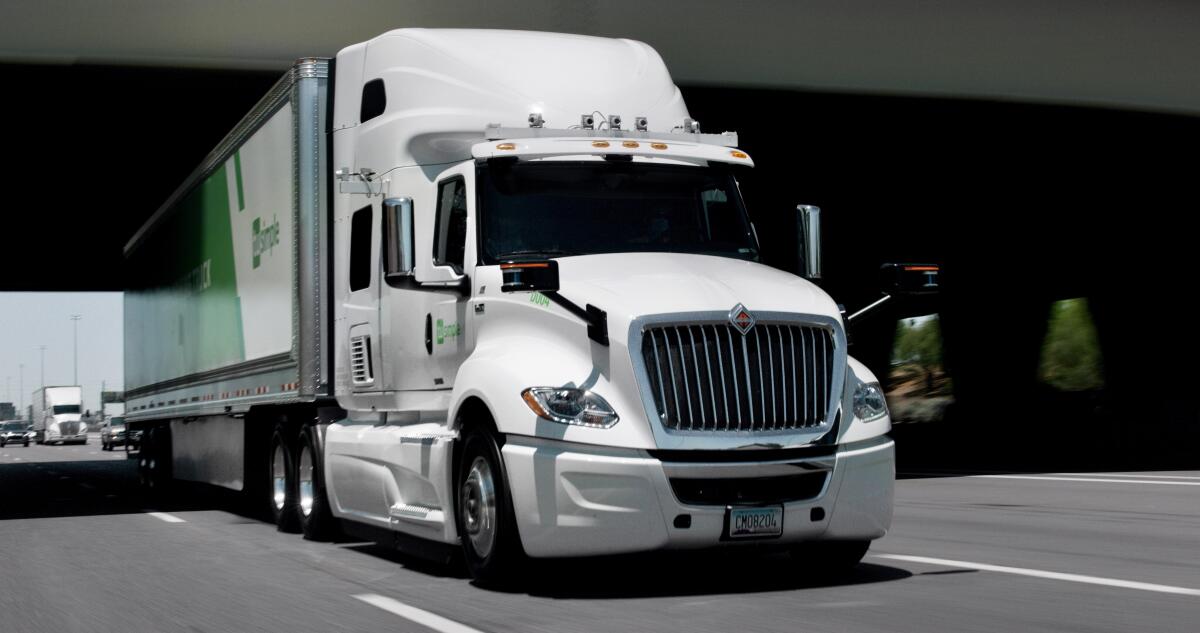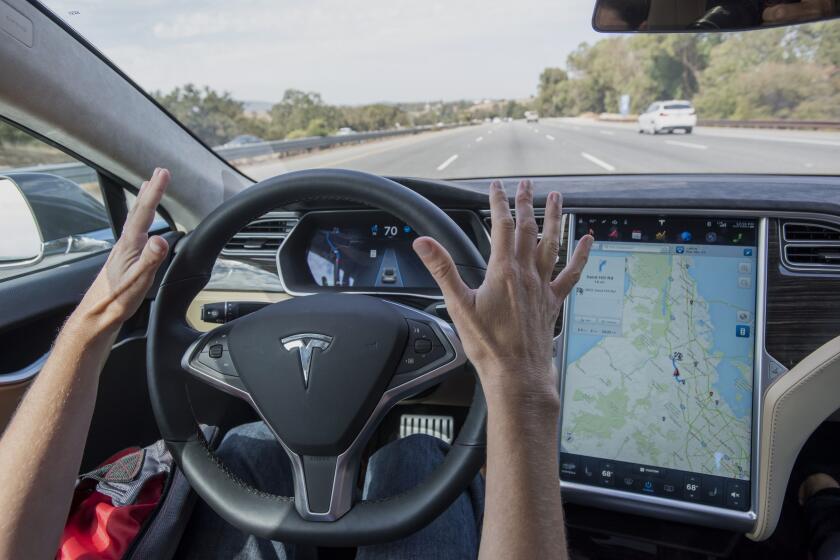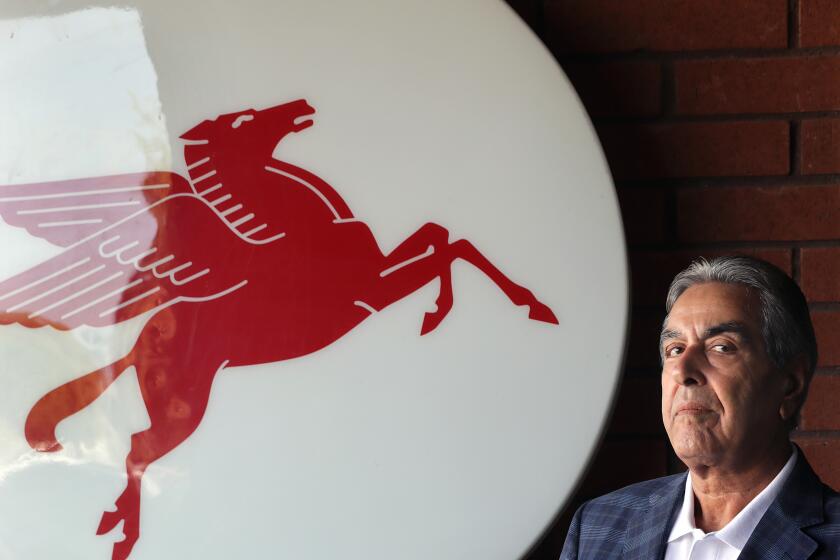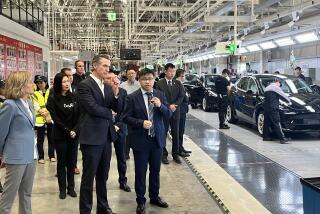Southern Californa self-driving truck firm TuSimple fires CEO over dealings with China startup

The San Diego company terminated co-founder Xiaodi Hou for sharing confidential information. Hou denies any wrongdoing.
San Diego’s TuSimple Holdings, which is developing self-driving technology for semi-trucks, fired its chief executive Monday after an internal investigation found that the company shared confidential information with a Chinese startup without proper disclosures.
TuSimple terminated Xiaodi Hou, who also was co-founder, chairman and chief technology officer of the publicly traded autonomous driving company.
While TuSimple said the firing stemmed from an ongoing internal review, the Wall Street Journal reported over the weekend that U.S. regulators are investigating Hou and TuSimple in dealings with startup Hydron, which operates mostly in China and is backed by Chinese investors.
According to the Journal, the U.S. Securities and Exchange Commission, the FBI and the Committee on Foreign Investment in the U.S. are involved. CFIUS is a federal interagency committee that conducts national security reviews of certain foreign investments in the U.S.
TuSimple’s shares plunged 46% on the news. The stock ended trading Monday at $3.43 on the Nasdaq exchange and slipped an additional 17 cents a share Tuesday.
Federal prosecutors are looking into claims made by Tesla and CEO Elon Musk about the capabilities of his company’s automated driving systems.
Hydron is working on autonomous zero-emission hydrogen big rigs. It was founded by Mo Chen, who also co-founded TuSimple.
Chen served as TuSimple’s CEO until September 2020, when he became executive chairman. He left TuSimple early this year. But he remains a big shareholder, along with Hou. Both own large amounts of special-rights Class B voting stock.
Founded in 2015, TuSimple is headquartered in San Diego and has locations in Arizona and Texas, where it does much of its testing. The company claims to have achieved multiple driverless test runs — known as Level 4 autonomy — in big rigs along an 80-mile, pre-mapped route between Tucson and Phoenix.
TuSimple also has operations in Europe and China. It went public in April 2021 at $40 a share — which valued it at nearly $8.5 billion at the time. On Monday, its market value was $770 million.
TuSimple said its board of directors concluded that a change of chief executive was necessary based on findings of an inquiry by its audit committee that began in July.
Owners of electric vehicles are making a quick buck by selling the cars they waited months to get, taking advantage of strong demand and tight supply. And not just Teslas.
“Transparency, good judgment and accountability are critical values to our company,” Brad Buss, lead independent director, said in a statement. “We take these values extremely seriously.”
Independent directors said that “fundamentally, we lost trust and confidence in Dr. Hou’s judgment, decision-making, and ability to lead the company as CEO.” The directors said the decision was not linked to recent media coverage.
In a message to employees posted on LinkedIn, Hou said he has been “completely transparent in both my professional and personal life, and I fully cooperated with the board because I have nothing to hide. I want to be clear that I fundamentally deny any suggestions of wrongdoing.
“Unfortunately, the board’s processes and conclusions have been questionable at best. As the facts come to light, I am confident that my decisions as CEO and chairman, and our vision for TuSimple, will be vindicated.”
Hou also said he was unaware of an FBI investigation of himself or the company.
A ban on sales of new gas-powered cars and light trucks is years off, but mom-and-pop gas station owners are already facing a dilemma: evolve for the EV era or sell out and move on?
TuSimple’s ties to China have gotten the attention of regulators before. Before TuSimple went public, CFIUS notified the company that it was examining its relationship with Chinese investors for national security concerns.
That investigation ended in February 2022 without an adverse finding, according to the company.
But TuSimple did enter into a “national security agreement” under which it adopted a technology control plan, appointed a security officer, established a board-level Government Security Committee and periodically reported to CFIUS monitoring agencies.
In a filing with securities regulators Monday, TuSimple revealed that during 2021, its employees spent paid hours working on matters for Hydron, also known as Turing Auto.
It estimated the value of what was paid at less than $300,000.
The company’s board was not notified and did not approve the related party arrangement, as required by the company’s governance policies, the filing said.
As high gas prices fuel demand for electric cars, people and companies are getting creative.
In 2022, the internal investigation found that TuSimple shared confidential information with Hydron and its partners before entering into nondisclosure agreements as part of a business deal.
When the misstep was discovered, TuSimple inked a nondisclosure agreement. But, TuSimple said, it does not know whether Hydron shared the information before the contract.
Ersin Yumer, TuSimple’s head of operations and an expert in machine learning and computer vision, will take over as interim chief executive while the company searches for a permanent replacement.
“The leadership team firmly believes in the benefits of our technology and is committed to the company’s commercialization roadmap,” Yumer, 38, said in a statement.
Hou was terminated without cause, which means he is entitled to severance benefits pending his resignation from TuSimple’s board of directors.
More to Read
Inside the business of entertainment
The Wide Shot brings you news, analysis and insights on everything from streaming wars to production — and what it all means for the future.
You may occasionally receive promotional content from the Los Angeles Times.















